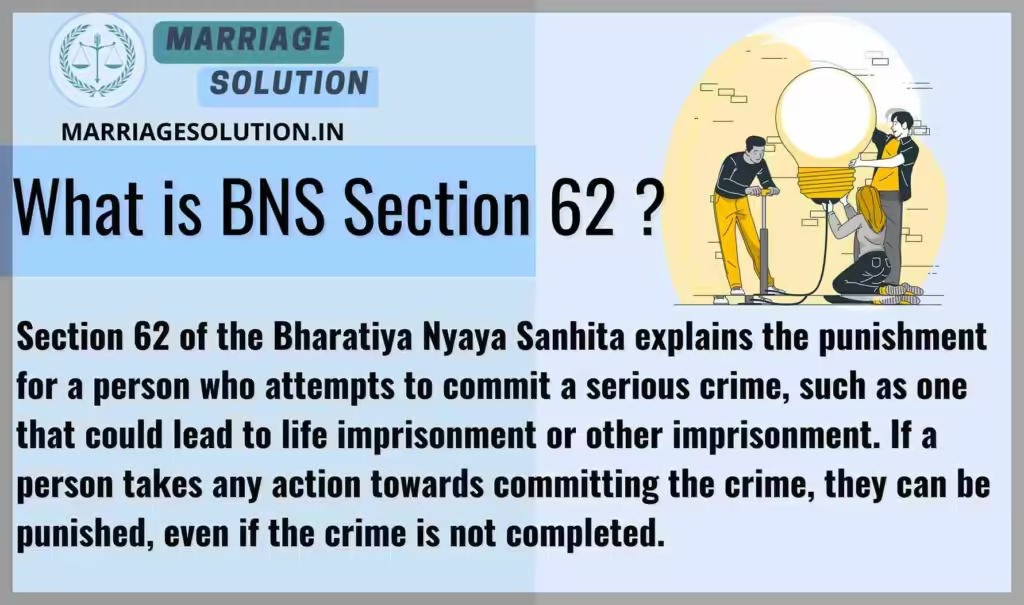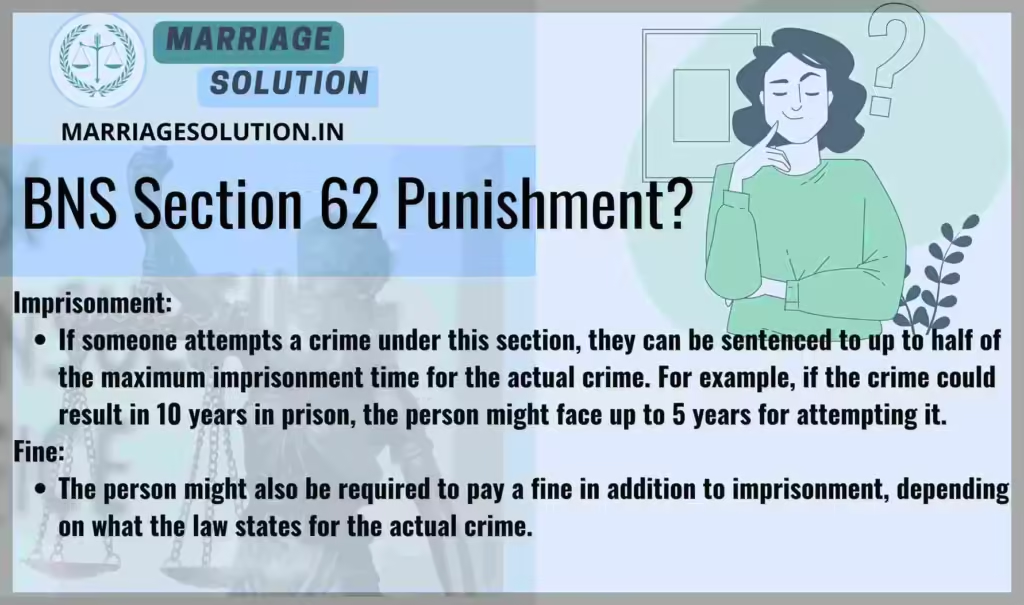Introduction of BNS Section 62
BNS Section 62 of the Bharatiya Nyaya Sanhita, 2023 deals with the punishment for attempting to commit offences punishable with life imprisonment or other imprisonment. It ensures that even if a crime is not fully carried out, the intention and clear steps taken toward committing it are treated as punishable acts. This reflects the principle that the law punishes not just completed crimes but also attempts, which can be equally dangerous for society.
What is section 62 of BNS ?
Section 62 of the Bharatiya Nyaya Sanhita explains the punishment for a person who attempts to commit a serious crime, such as one that could lead to life imprisonment or other imprisonment. If a person takes any action towards committing the crime, they can be punished, even if the crime is not completed.

Section 62 Bharatiya Nyaya Sanhita
BNS Section 62 deals with the concept of attempt in criminal law, i.e., when a person intends to commit a crime, takes steps towards it, but the offence is not successfully completed.
(This corresponds to the repealed IPC Section 511 of the Indian Penal Code, 1860.)
1. Meaning of Section 62
- Section 62 applies when a person does any act with the intention to commit an offence, but fails to achieve the final result.
- The act must go beyond mere preparation and enter the stage of execution, showing clear intention to commit the crime.
- Even though the offence is not completed, the law punishes the attempt because the person’s conduct is dangerous to society.
Example:
- A tries to pick someone’s pocket, but the pocket is empty.
- A shoots at B with intent to kill, but misses.
Both are punishable attempts under Section 62.
2. Purpose of Section 62
The section ensures that:
- Criminals cannot escape liability merely because their plan failed.
- Society is protected from individuals who are ready and willing to commit crimes.
- Law punishes the dangerous conduct itself, not just the final result.
3. Essential Ingredients of Section 62
For Section 62 to apply, three conditions must exist:
- Intention – The accused must have the intention to commit a specific offence.
- Act towards commission – The accused must do some act which goes beyond preparation.
- Non-completion – The crime must remain incomplete, either due to external reasons or failure of execution.
4. Punishment under Section 62
- The punishment for attempt is up to half of the maximum punishment prescribed for the offence attempted.
- The offender may also be punished with fine, or both imprisonment and fine.
- If the offence attempted is punishable with death or life imprisonment, then attempt may attract rigorous imprisonment up to 10 years, depending on the gravity.
5. Examples of Section 62 in Action
- Attempted Murder: Firing a gun at someone but missing.
- Attempted Theft: Trying to break into a house but caught before stealing.
- Attempted Fraud: Submitting forged documents but discovered before they are used.
- Attempted Rape: Assaulting with intent but stopped by intervention.
- Attempted Suicide Abetment: Encouraging someone to commit suicide but they survive.
6. Importance of Section 62
- It closes loopholes by punishing incomplete crimes.
- Balances fairness by prescribing lesser punishment than the completed crime.
- Protects society from persons who pose a real threat but failed in execution.
- Brings uniformity with global criminal law principles where attempt is a recognized offence.
Section 62 BNS Overview
BNSS Section 62 addresses situations where a person attempts to commit a crime punishable with life imprisonment or long-term imprisonment but does not succeed. The law makes sure that even incomplete crimes are treated seriously, because the intention and actions taken to commit the crime are themselves dangerous to society.
Detailed Explanations of BNSS Section 62
1. What is It About?
Section 62 focuses on punishing people who attempt to commit crimes that carry life imprisonment or long terms of imprisonment. It ensures that failed crimes are not ignored but are punished according to their seriousness.
2. Incomplete Crime
The section applies even if the crime is not completed. As long as a person takes steps towards committing the crime, they are guilty. For example, trying to poison someone but being stopped before they drink it is still punishable.
3. Types of Crimes Covered
This section is meant for serious crimes, the kind that can lead to life imprisonment or heavy punishment. Examples include murder, rape, armed robbery, terrorism, and other severe offences.
4. Punishment Limits
If a person is guilty of an attempt, they can face up to half of the maximum punishment for the crime they tried to commit. This balances the seriousness of their actions with the fact that the crime was not fully carried out.
5. Imprisonment or Fine
The punishment may include imprisonment, a fine, or both. Courts have flexibility to decide the severity based on the facts of the case.
6. Cognizable or Non-Cognizable
Whether an attempt is cognizable (police can arrest without a warrant) or non-cognizable (police need a warrant) depends on the crime that was being attempted. For serious crimes like murder, attempts are always cognizable.
7. Bailable or Non-Bailable
The bail status also depends on the nature of the crime attempted. If the main crime is non-bailable (like murder or terrorism), then the attempt is also non-bailable. For minor offences, it may be bailable.
8. Court Jurisdiction
The same court that would handle the main offence also has jurisdiction to handle the attempt. This ensures consistency. For example, if someone attempts murder, the sessions court will handle the trial, just as it would for actual murder.
9. Examples of Attempt
If someone tries to break into a house to commit theft but is caught before stealing anything, they can still be punished under this section. Similarly, firing a gun at someone but missing is still an attempt to commit murder.
10. Legal Consequences
Section 62 ensures that even failed crimes are punished so that people do not get away by saying “nothing happened.” It deters criminals from trying serious offences and protects society from dangerous intentions.
BNS 62 Punishment
Imprisonment:
- If someone attempts a crime under this section, they can be sentenced to up to half of the maximum imprisonment time for the actual crime. For example, if the crime could result in 10 years in prison, the person might face up to 5 years for attempting it.
Fine:
- The person might also be required to pay a fine in addition to imprisonment, depending on what the law states for the actual crime.

BNS 62 bailable or not ?
BNS Section 62 is bailable or non-bailable depends on the nature of the crime that was attempted. For serious crimes, it is usually non-bailable, meaning the person cannot easily get out on bail. For less serious crimes, it may be bailable.
Comparison: BNS Section 62 vs IPC Section 511
| Section | Offense | Punishment | Bailable / Non-Bailable | Cognizable / Non-Cognizable | Trial By |
|---|---|---|---|---|---|
| BNS Section 62 |
Deals with attempt to commit offences under BNS. Applies when an act is done with intent to commit a crime but the crime is not completed. |
Imprisonment up to half of the maximum term provided for the offence attempted, or with fine, or with both. | Depends on the main offence attempted | Depends on the main offence attempted | Court competent to try the main offence |
| IPC Section 511 (Old) |
Dealt with attempts to commit offences under IPC. Applied when a person intended and attempted but failed to commit the offence. |
Imprisonment up to half of the maximum term provided for the offence attempted, or with fine, or with both. (Same as BNS provision, but under IPC 1860). |
Depends on the main offence attempted | Depends on the main offence attempted | Court competent to try the main offence |
BNS Section 62 FAQs
BNS 62 Is the offence under this section bailable?
Whether the offence is bailable or not depends on the nature of the crime that was attempted.
What does BNS Section 62 cover?
It covers the punishment for attempting to commit a crime that could lead to life imprisonment or other serious imprisonment.
BNS 62 under Can someone be punished if they fail to commit a crime?
Yes, even if the person fails to complete the crime, they can still be punished if they took steps towards committing it.
Conclusion
BNS Section 62 plays a vital role in ensuring that crimes are not excused simply because they remain incomplete. It recognises that the intention and actions taken towards committing an offence are in themselves a serious threat to society. By punishing attempts, the law sends a strong message that even failed criminal acts will not go unpunished. At the same time, it balances justice by prescribing a lesser punishment than the completed crime, reflecting the difference in gravity. Overall, Section 62 strengthens India’s criminal justice system by closing loopholes and safeguarding society from dangerous offenders who are stopped before success.
Need Legal Support?
If you are dealing with court cases, marriage problems, or any other legal issue, our team at Marriage Solution – Lawyer Help is here for you. Simply fill out our quick online enquiry form, and we’ll connect you with the right legal expert to support your needs.
Finished with BNS 62 ? Continue exploring the next provisions of the Bharatiya Nyaya Sanhita (BNS), 2023. Each section includes explanations, examples, and plain-language breakdowns for easy understanding.
- BNS Section 63 : Rape .
- https://marriagesolution.in/bns_section/bns-section-63/
- BNS Section 64 : Punishment for rape .
- https://marriagesolution.in/bns_section/bns-section-64/
- BNS Section 65 : Punishment for rape in certain cases.
- https://marriagesolution.in/bns_section/section-65-bns/
- BNS Section 66 : Punishment for causing death or resulting in persistent vegetative state of victim
- https://marriagesolution.in/bns_section/bns-66/
- BNS Section 67 : Sexual intercourse by husband upon his wife during separation or by a person in authority.
- https://marriagesolution.in/bns_section/bns-67/
Full IPC Section List: https://marriagesolution.in/ipc-section-list
All Indian Law & Blogs: https://marriagesolution.in/indian-law/
Full BNSS Section List: https://marriagesolution.in/bnss_section-list
